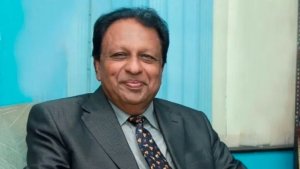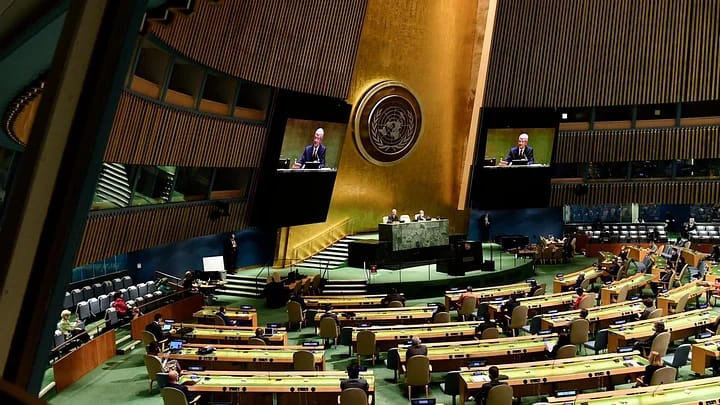
India At UN: Legitimate Criticism And Unrealistic Expectations

UNGA|Photo credit: The National
“The whole world is fighting the global pandemic of Corona for the last 8-9 months. Where is the United Nations in this joint fight against the pandemic? Where is its effective response?”
This poignant question by Prime Minister Narendra Modi against an organisation, which was meant “to save the succeeding generations” reverberated in the physically empty, but well-connected hall of the UN General Assembly on September 26, 2020.
He was speaking on the theme, “The future we want, the United Nations we need: reaffirming our collective commitment to multilateralism – confronting COVID-19 through effective multilateral action”.
The whole world felt frustrated when the then President of the Security Council, China, held the UN to ransom in total disregard of multilateralism and the dire need for collective action to meet the greatest threat to international peace and security humanity ever faced.
Given the theme of the current session of the UN General Assembly, the link that PM Modi made between UN reform and inaction in dealing with the pandemic was most appropriate. The UN has had its successes and failures, but the total paralysis in the face of an existential threat to humanity was shameful.
The veto of a permanent member was never as disastrous as it happened at the outset of the pandemic. Like in the cases of other health emergencies like HIV/AIDS, Ebola and SARS, the entire system should have been geared to launch a global fight against the pandemic.
The UN reached rock bottom when it failed to respond to COVID-19, the biggest threat to peace and international security it ever faced. To characterise the pandemic as a health issue to be left to the WHO and to refuse even to hold a Security Council meeting to discuss it was the unkindest cut of all.
Even the iota of hope that humanity had that the UN might prevent a catastrophe evaporated in March 2020 when China prevented a meeting to consider preventive and combative action. The Security Council should have created a “Health Keeping Force” to reach the far-flung corners of the world where the danger still lurks. Multilateralism was already on its last legs, following its rejection by President Trump, but now it lies crippled and paralysed.
India could have proposed measures like a universal ceasefire, lifting of all economic sanctions and the formation of a special emergency force to reach help to the needy. The world had begun to look away from the UN for alternatives.
Having castigated the UN on its paralysis when it was most needed to save humanity from the pandemic, PM Modi turned to the question as to “the future we want, the UN we need.” He asked very pertinent questions about the reform process initiated by several countries including India in 1979.
“Today, people of India are concerned whether this reform-process will ever reach its logical conclusion? For how long will India be kept out of the decision-making structures of the United Nations? A country, which is the largest democracy of the world, a country with more than 18% of the world population, a country, which has hundreds of languages, hundreds of dialects, many sects, many ideologies, a country, which was a leading global economy for centuries and also one which has seen hundreds of years of foreign rule. How long would a country have to wait particularly when the changes happening in that country affect a large part of the world?”
India’s case for a permanent seat on the UN Security Council and its frustration over lack of progress could not have been voiced better. PM Modi also stressed its commitment to the UN and its global responsibilities.
During India’s term in 2021-22, “we will use the prestige and experience of the largest democracy for the benefit of the whole world. Our path goes from human welfare to the welfare of the World. India will always speak in support of peace, security and prosperity. India will not hesitate in raising its voice against the enemies of humanity, human race and human values – terrorism, smuggling of illegal weapons, drugs and money-laundering. India’s cultural heritage, tradition, thousands of years of experience will always stand in good stead for the developing countries. India’s experiences, India’s developmental journey with its ups and downs will strengthen the way towards world welfare,” he said.
While PM Modi’s point about the failure of the UN to rise to the occasion at the outset of the pandemic has resonated well and the need for reform is well understood, his assertion that India cannot be kept outside the decision-making structures of the UN any longer may be seen as unrealistic. As of today, there is no consensus on any formula that will give India a place in the Security Council, except as a non-permanent member from time to time.
The pathetic state of the UN today on the occasion of its 75th anniversary, however, is on account of the gradual and steady erosion of the UN as the conscience of humanity. The fault lay in its creation itself as the victors’ conclave with non-democratic features like the veto and designating of enemy countries.
The Cold War that erupted soon after caused its own complications when the allies during the war became feuding superpowers. A kind of balance for fear of mutually assured destruction prevented a Third World War, but the UN could not save the succeeding generations from the scourge of war. But its finest hour was when the UN fought a war to liberate Kuwait with rare unanimity among the permanent members.
The UN had its critics throughout its history, but it survived essentially because it was different things to different member states.
For the major powers, it was an instrument of their foreign policy, the middle powers created their own space in international power game and the least developed countries saw it as a guarantor of their sovereignty.
For India, it has been a forum to set standards of international behaviour and to share its own experience with the rest of the world. None was satisfied with its performance, but they relied on the lowest common denominator to justify their involvement. The efforts made to dilute the sovereign equality of member states or to reconstitute the main decision-making bodies have failed so far.
Everyone wants reforms, but they should be consistent with their own vision. But one man’s vision is another man’s nightmare. An expansion of the Security Council is a mirage that recedes every time it appears near and there is no proposal today which can muster the requisite support.
Most of the important countries did not call for a return to multilateralism, as though they had discovered the merits of splendid isolation, following President Trump’s dictum to keep one’s own country first. How that policy has turned the US into what it is today seems of no concern. China’s pseudo- multilateralism has no takers either. India, having approached the pandemic as an opportunity for multilateral and regional cooperation, has the credentials to champion multilateralism.
However, the exchange with Pakistan at the General Assembly, the unprecedented walk out by the Indian delegate and the moves by China inside and outside the UN point to the hazards India will face during the 75th session in realising its objectives.
The Turkish President of the General Assembly is also not likely to be helpful to India. Our delegation to the Security Council, though led by Ambassador TS Tirumurti, an astute diplomat, supported by two experienced Deputies and a strong team, will have a hard time to fulfill the expectations of reform.
